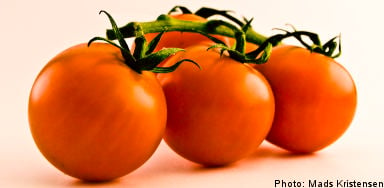In the science fiction film Attack of the Killer Tomatoes from 1978, innocent people are arbitrarily attacked by gigantic, mutated tomatoes with homicide on their minds. I thought it was funny when I saw that cult film some years ago. But truth is stranger than fiction. And I’m not laughing now.
The vegetable and fruit counters of all our major Swedish food retailers are a horror show. Sure, there are plenty of pretty red, pink and yellow orbs on display which are labelled as tomatoes; but these are impostors from another planet.
It doesn’t matter if they call themselves plum tomatoes from Holland, cherry tomatoes from Italy or Israel, or if they present themselves as deep red tomatoes still on the vine from Spain. The enemy has many guises.
These attractive but counterfeit tomatoes are convincing, unless you examine them with a critical eye. Quickly, you will observe that each industrial tomato of a given type is nearly identical, a perfect clone of its brother or sister. They are all the same, and all equally ripe. How is that possible?
Anyone who has ever planted a vegetable garden in their back yard knows that honest, natural tomatoes ripen at different rates: it is rare that all the tomatoes on a single vine mature and change to red at the same time, and they rarely have an identical size or exactly the same shape.
I’m not denying that the cloned objects sold in ICA or Coop resemble genuine members of the tomato family, just as man-like robots can closely resemble human beings.
But the difference between a real tomato and an extraterrestrial copy is obvious: just taste the suspect fruit. If they don’t have the slightly tart, delicate taste of a real tomato, they are clearly frauds.
Dissection is another method for detecting fake tomatoes. False fruit usually have a hard outer wall, thick and stiff as a sheet of cardboard. These wannabe-tomatoes taste like water and have zero aroma, and they are built to last a long time.
Resilient tomatoes from outer space pose a serious threat to our Western way of life, or at least to our tossed salads. Hope, however, is just around the corner.
The hours of sunlight here in Northern Europe are increasing with each passing day, and it won’t be long before our juicy and genuine native sons—sun-ripened ”tomater” from southern Sweden or Denmark—make the long trek north to the capital city Stockholm.
Of course, there is also a simpler way to make sure that the sliced tomato in your salad is the real thing: just grow your own.



 Please whitelist us to continue reading.
Please whitelist us to continue reading.